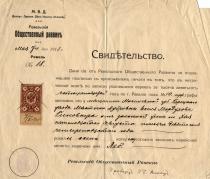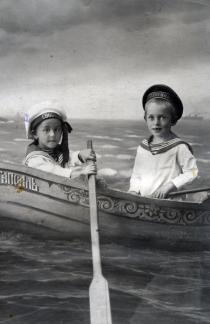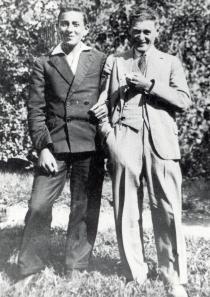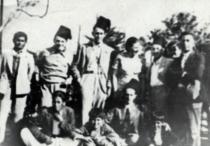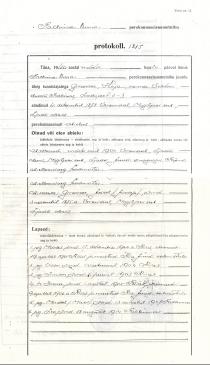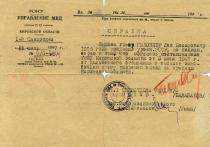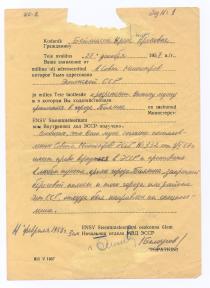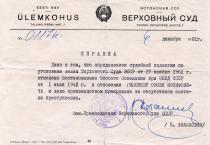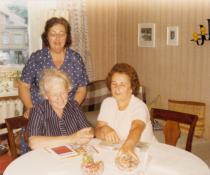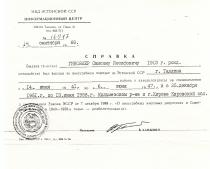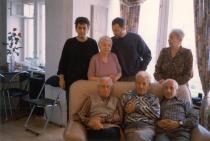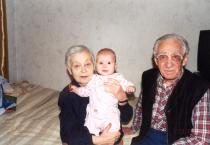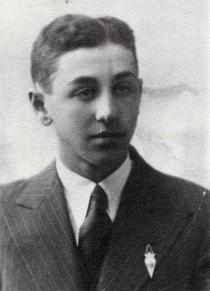
Leo Ginovker
Tallinn
Estonia
Interviewer: Emma Gofman
Date of interview: January 2003
When I first called Leo Ginovker on the phone his wife was unwell, so we agreed to conduct the interview on the premises of the Jewish Community of Estonia. At our meeting I encountered a lively man who was not tall and did not at all look old. I was very surprised to find out that the year of his birth was 1914. He seemed a very friendly, optimistic, and sociable person with a good sense of humor. Leo Ginovker was reluctant to be interviewed; he thought his life could hardly be interesting to anyone. As for his present-day life, he said he and his wife could still manage without anyone else’s help and had no financial difficulties. One thing that does not allow him to live his life to the full is his age and ailments that come along with it.
My parents
Growing up
My school years
During the war
Married life
Glossary
Both my parents were born and grew up in the same small village [shtetl]. It was called Lyady and situated in the eastern part of Mohilev region, Russia. At present, it is part of Belarus. Both my grandmothers and grandfathers lived and died in that village. I never met them and know very little about them. The name of my father’s father was Mordukh Ginovker. I don’t know the name of my father’s mother. She died early and my grandfather remarried. From his first marriage, Grandfather Mordekhai had two sons: the elder one, my father Joseph – his Jewish name was Yesel – was born in 1875, and the younger one, David, in 1883.
David graduated from a gymnasium and a dentists’ school in Russia. He made the decision to leave Russia in 1905 when Jewish pogroms started. My father, who owned a small shop at the time, gave him the money and he was able to leave for Canada. There he worked as a dentist. In the early 1930s, Uncle David and his two daughters, Mara and Vera, came to visit us in Tallinn. I remember he kept thanking my father for his help. When Mara and Vera grew up they moved to the USA. I know nothing about any of my father’s other relatives and this is why: In 1918, when I was but four years old, Estonia separated from Russia and became an independent bourgeois state [see Estonian Independence] 1. All of our relatives remained in the USSR. We had no opportunity to meet and talk with them. Perhaps, my parents told us, their children, some things about their relatives, but I don’t remember. While I was still young I wasn’t interested in the subject, and when I grew up there was no one to ask. I remember that in the early 1920s, when there was a food crisis in the USSR [see famine in Ukraine] 2, my parents would send several packages of clothes and food to their parents in Lyady through some organization. Later, this opportunity ceased to exist, and later again we were told that our grandparents had died.
My father had studied in cheder and was quite well-educated. His first language was Yiddish, but he could speak and write Russian fluently. For several years after graduating from cheder, my father lived alone in a place called Dubrovny, also in Mohilev province. He worked in a bakery, first as an apprentice and later as a principal worker. When he thought he had saved up enough money, he decided he was ready to marry and start his own business. He had been acquainted with his future wife – my mother – since their childhood; their families lived close to each other.
My mother, Haya Ginovker, nee Vysotskaya, was born in 1878. Her parents were Fridman Vysotsky and Hanna Vysotskaya, nee Ratner. My mother didn’t study much as a child. She could speak, read and write Yiddish well, but she could only speak Russian. In order to marry, my father went to Lyady where my mother lived with her parents. I think that both my father’s and my mother’s families were very religious because my parents knew all the religious laws and traditions very well. I don’t know what my grandfathers’ occupations were, but their families were very poor. I remember my father said that if he and my mother had settled in Lyady they would have been just as poor as their parents. My parents got married in the spring of 1900; the wedding took place in the synagogue in Lyady.
After the wedding they moved to Riga – 600 kilometers away. My father had some friends that had moved there a few years earlier. My parents wanted to escape from that small-place poverty, and, besides, it would have been hopeless to start a business in a small impoverished Jewish town. My mother never visited her birth place or saw her relatives afterwards, but my father visited both my mother’s and his own parents and offered them help on several occasions before the Russian Revolution of 1917 3. In Riga, my parents rented a small bakery and worked there together. My father baked bread and cakes and my mother sold them. They lived in Riga for six years.
During this time they had four children, but two of them died in infancy. In 1906 my parents and my two brothers – Ovsei, born in 1902, and Samson, born in 1903 – moved to Tallinn, then called Revel, in the province of Estland. There my father opened a small shop where they sold tea, sweets, herring and other groceries. My father traveled to Russia to get his goods. They lived in a small apartment, which they rented from the city’s mayor. The mayor was Estonian and he and our family were on very friendly terms before 1940. He would often come to see us at our sweets factory and left with his pockets full of sweets.
My father’s business was doing well, and six years later my parents were able to buy a house. It was a wooden two-storied building with four apartments and a beautiful large garden. In the garden there was blooming lilac, a water fountain, and a live peacock. They had to give up all this beauty because my father began to build up his business. A small sweets factory was constructed in the backyard, and the basement was turned into a bakery. My father named his firm Orel [Russian for ‘eagle’]. By 1920 it employed several dozen workers.
Our family had grown by that time: my third brother Max – his Jewish name was Mendel – was born in 1907, and I followed in 1914. At birth I was given the name of Leo, but for my entire life they called me Moritz. When I was a child, we read a fairy tale, and Max and Moritz were the names of the two characters. My brother’s name was Max, so my elder brothers began calling me Moritz. This is what they called me at home, at school, and even afterwards. My old friends still call me Moritz, although I am Leo according to all the papers.
Our house was quite comfortable. It had electricity, running water, and a sewerage system. There was stove heating. I remember the yard-keeper brought in the firewood. We lived on the second floor, and our apartment had seven rooms. We put the other three apartments up for rent. Another Jewish family lived in a small apartment next to ours for a long time. The head of the family was a tall stout man. He owned a slaughter-house and a shop where he sold kosher meat. I played checkers with him. Before he played, he could drink a shtof of vodka and still win several games in a row. [shtof: Russian unit of liquid volume, in use before the metric system was introduced; equal to 1.23 liter. Bottles containing such volumes were produced in Russia.]
My mother couldn’t manage the household on her own anymore, so we hired a servant. An Estonian woman helped my mother in the kitchen, and another one cleaned the apartment. I had a nurse until I turned six. She was an old Estonian lady. Thanks to her, I easily mastered Estonian. Several languages could be heard in our house. My mother and father always spoke Yiddish to each other. My brothers and I knew Yiddish but didn’t use it much. My brothers studied in a Russian gymnasium so Russian became the main language of communication in the family. My parents also spoke Russian to us. We spoke Estonian to the servants although our parents didn’t know it well. At that time, three languages were spoken in Estonia: Estonian, Russian, and German. Our parents got by with Russian without major problems.
My parents weren’t very religious, but the family kept the most important Jewish traditions. We only bought kosher meat in specialty shops. In Tallinn, there were three shops that sold only kosher food. Our kitchen wasn’t strictly kosher because we didn’t have separate dishes for dairy and meat products. My father and mother always ate only kosher food, but it wasn’t obligatory for the children. On holidays my parents went to the synagogue, and my brothers and I also went when we were young. My father would translate the Hebrew prayers for us and explain their meaning.
We, boys, all had our bar mitzvah. A friend of my father’s who also came from Lyady prepared me for my bar mitzvah. His name was Avrum Levin. He was a very well-educated man, an expert in the Torah and Hebrew. He taught me for several months and at my bar mitzvah I was able to read a passage from the Torah well. It took place in the Tallinn synagogue 4, and a rabbi conducted the ceremony. Besides our family, a lot of our friends were there, too.
As we grew up my brothers and I didn’t attend the synagogue anymore. I suppose our parents didn’t mind.
Our family always celebrated Jewish holidays such as Rosh Hashanah, Chanukkah, and Pesach. I remember that just before a holiday everything in the apartment was cleaned, washed, and scrubbed, especially before Pesach. We always had seder on Pesach, and, of course, matzah. My parents were outgoing hospitable people. So we always had many guests at our dining table. Many of our friends would always come. My parents were closely associated only with Jewish families – some of them also came from various places in Belarus. My father had quite a hot temper, but my mother was a gentle and kind person. They counterbalanced each other. We never had any rows or loud brawls at home; we treated each other with respect and understanding. My father was an active enterprising man and always worked a lot. He was also an honest and just person. Everyone who had to deal with him had profound respect for him. He wasn’t interested in politics or social life. He didn’t join any parties, societies, or corporations that sprang up in large numbers during the Jewish Cultural Autonomy in Estonia. 5
My father read a lot, and then my brothers and I also became fond of reading. We had a large library; my father’s study was full of bookshelves. There were books in Russian and Yiddish. Naturally, there were more Russian books – not too many Yiddish books were published in Estonia and Russia. We had a splendid edition of Dante’s Divine Comedy in two volumes in our collection, there were gorgeous gilded-bound volumes of Adventures of Czar Nikolai, and some books in Yiddish – by Sholem Aleichem 6, a volume of poetry by Haim Nachman Bialik 7, works by Sholem Asch 8 and Simon Dubnow’s 9 ‘The History of Jewish Nation’.
We subscribed to newspapers in Russian. One paper, as I remember, was called Segodnya [Russian for ‘Today’] and published in Riga. It had a supplement called Vesti Dnya [Russian for ‘The Day’s News’], which was published in Tallinn. These papers talked about everyday local news related to both culture and business, and also contained ads. There were few political articles; it seems to me that people in Estonia weren’t interested in politics much at the time.
At the time, Tallinn was a small but fairly modern city. The center of the city consisted of three- and four-storied buildings. The larger part was made up of one or two-storied wooden buildings, though. In the streets, the traffic area was pebbled, and sidewalks were flagged. One of the central squares was used as a marketplace. As far back as I can remember, there were always cars, taxis and trains in Tallinn. Horses were used to transport merchandise around the city. The horses were big and strong. They were harnessed to large wagons in the summer, and to sledges in the winter.
I remember very well the day when our whole family went by airplane for the first time. I was six or seven years old then. Some company organized airplane tours of the city. The flight was about ten minutes long. My mother was very afraid to fly and didn’t allow our entire family to be on the same airplane; so, I was in the airplane with my father and mother, and my brothers flew next.
My mother loved novelties. In 1924 we already had our first radio. We could only listen to it through the headphones until we got our next radio, powered by large batteries. In the late 1930s all of our friends would come to our place to wonder at the electric refrigerator that our father gave to my mother.
My parents enjoyed going to concerts and plays. Most of the times they were Russian performances, only sometimes Yiddish ones. Actors of the Jewish Drama Society from Tartu and Riga gave performances. My parents never went to restaurants: it wasn’t a family custom.
Both my father and mother had radiculitis, and every summer starting from 1915 or 1916 they went to mud bath resorts. There were two such resorts in Estonia: the small town of Haapsalu [before 1918 – Gapsal] just south-west of Tallinn on the coast of the Baltic Sea, and the town of Kuressaare on the island of Saaremaa. They took a train to get to Haapsalu, and a boat to get to Kuressaare. My brothers were too big and not interested in visiting resorts, but I went along with my parents for several summers. We didn’t have a summer cottage of our own, so we rented one. My parents went to the clinic to get treatment. On one occasion they even put me into a mud bath. Our friends and their families usually rented summer cottages nearby. For several successive summers it was the Izrim family. The head of the family was my father’s business partner at the time. Ilya, their son, was two years older than me, and we had a very good time together. Many years later, during the Soviet power, Ilya worked as head of department in the Estonian Ministry of Health.
Another friend of mine, Aron Tamarkin, often used to stay with us in the summer cottage because his family couldn’t afford one. Our fathers were fellow countrymen and good friends since their early years. Shmarya Tamarkin, Aron’s father, was the first principal of the Tallinn Jewish Gymnasium. Besides, he taught Yiddish there. Aron was a good musician, a cheerful and interesting person. He and I were friends throughout our lives. During the Soviet period, he worked as an administrator at the Museum of Theatre and Music in Tallinn. Besides Estonians, Finns and Swedes visited the Estonian resorts at the time. There were a few Jewish families; all of them were in close communication with each other, they would get together in the evenings, talk in Yiddish and sing Jewish songs. Our family never stayed at a resort for a long period. My parents would go through two or three weeks of treatment and then we went back home. For my father, his job was always first priority.
In 1920 I entered the 1st grade of the Jewish elementary school in Tallinn. It was housed in a small two-storied building that belonged to the Gildebrant family of teachers. The Jewish community rented the building for the school. The Gildebrant couple were Russian immigrants; they taught geography and maths at our school for several years. Ours was a large class of about 25 students. The school had just opened the previous year, so it only had two classes. We were taught in Russian, but studied Yiddish, Hebrew, and Estonian from the 1st grade onwards. Later on, our school moved into a synagogue, or rather into a synagogue extension. In 1924 the new building of the Tallinn Jewish Gymnasium 10 was opened, and we began studying there. The school belonged to the Jewish community. Perhaps, the state also supported it – I don’t know for sure. We had to pay for tuition, but the community paid for the poor.
Jewish holidays were celebrated in the school; there were hobby groups. The celebrations have escaped my memory, but I remember participating in hobby groups. When I was in the 8th grade, I attended a Zionist group called ‘Emuna’ [the word means ‘faith’; the group was organized by Jewish students from Tartu] We were not right wing as the Betar 11 Zionist movement, or left wing as the Zionists of Hashomer Hatzair 12. We were in the middle. We read books on Palestine, prepared reports on Zionism, and dreamed of going to Palestine and building a Jewish state. Later, many of us actually went there. My friend David Gershanovich whose family didn’t live far from us was one such person; he had seven or eight siblings. David was a year older than me. He was 18 when he went to Palestine. As in many Jewish homes, we always had two money boxes in our house. One of them – Keren Kayemet 13 – was white and blue, the other one – Keren Hayesod 14 – was yellow. They were used to save money to buy land in Palestine.
While in school, I enjoyed going to sports clubs. Gymnastics was at an especially good level. The instructor was Utekhin, formerly an officer in the Czarist army. I played football, did gymnastics, track-and-field, and I was a member of the Maccabi 15 sports club, but I didn’t have any exceptional achievements.
I did well in all school subjects. Languages came especially easy to me. When I graduated, I knew Russian, Estonian, German, Yiddish and Hebrew well. I also took private English lessons; my English teacher came to our house.
I didn’t come to terms with music, though. Music lessons at school were taught by Gurevich, a musician from the Tallinn synagogue. When he came to teach a lesson, he carried a very interesting hexahedral accordion. We had an audition at our first music lesson. When it was my turn, he extracted a note from his tuning fork and I sang that note. Then the teacher said, ‘Go and don’t come to my lessons anymore.’ I’m still angry at him. As for music, I do love it. As an adult, I enjoyed attending symphonic concerts, especially when the orchestra was directed by Eri Klas, my music teacher Gurevich’s grandson.
Ovsei was my eldest brother. He graduated from a Russian gymnasium in Tallinn and served a year in the Estonian army in a battalion that built bridges. Then he studied in Germany to become a mining engineer. For some reason, Ovsei seriously wanted to go to the USSR to work as a mining engineer, fortunately it didn’t work out. In the middle of the 1920s he returned to Tallinn. At first, he helped our father, but then he started his own business. Together with a partner he built a dye-works and dyed cloth. Later, Ovsei and one of his partners bought a small boat and did business lifting sunken ships off the bottom of the Gulf of Finland. He never married.
Samson was my second oldest brother and his birth certificate actually has his name as Simson. He also graduated from a Russian gymnasium in Tallinn and went to study in France. He lived in the city of Toulouse for three years, but evidently didn’t study too heartily. Samson came back to Tallinn without a degree and began working in our father’s company. He dealt with the finances. In 1938 or 1939, Samson had a serious love affair with an Estonian woman. He wanted to marry her, but our parents didn’t give their consent. Samson didn’t act against their will. In despair, he went to Riga and married a young Jewish girl. Her name was Inna. Samson was much older than his wife. It wasn’t a love-match, of course. The newly-weds settled in our house, in the apartment next door. They expected their first child in June 1941.
The name of my third brother who was seven years my senior, was Mendel, but for as long as I can remember our family always called him Max. When he received his passport, Mendel officially became Max. After graduating from a Russian gymnasium and serving in the army as a field engineer, Max went to study in Genoa, Italy. He received the degree of a shipbuilding engineer and returned to Tallinn. A year later, he went to study again, this time to London, UK. Our parents, who hadn’t had the opportunity to study well as children, realized the importance of good education and didn’t spare money to provide for their children’s studies. Max graduated from a university in the UK and came back home just before the war. He enjoyed studying; by the end of his life he had four university degrees. Max had a great talent for languages. He knew Russian, Estonian, Yiddish, Hebrew, English, German, and Italian well.
I graduated from school in 1931. My mother urged me then, ‘Keep on studying, son! Go wherever you want, just keep on studying!’ But I didn’t go anywhere. For some time I just took life easy and had fun with friends, but then my father started introducing me into the affairs of his company. It was then named ‘Ginovker & Co’ and employed about 300 people. The core of the company was a large chocolate factory that my father had built in the late 1920s. It produced chocolate, chocolate sweets, fruit jelly, biscuits, hard tack for the Estonian army, and matzah for the Jewish community. I was responsible for export – our products weren’t only sold in Estonia but all over the world. We shipped our sweets to the USA, Britain, Sweden, South Africa, etc. I browsed through business catalogues to find importing companies, made contracts with them, and shipped the goods. I liked the job.
In 1934, I was drafted into the Estonian army for one year. I served as a private in the 10th infantry regiment stationed in Tallinn. We lived in a casern, occasionally we got the permission to go home for a weekend. We, ordinary men, didn’t perceive any signs of growing threat of aggression from either West or East.
In 1935, the team of our Maccabi sports club was going to take part in ‘Maccabiade’ games in Palestine. Two of my good friends were in the team. One of them was a weight-lifter, the other a tennis player. I decided to go along as a supporter, all the more since it gave me an opportunity to meet our business partners in Lebanon and Egypt. The trip turned out very interesting. We took a train via Warsaw and Vienna to the Romanian port of Constanta, and then took a boat to Haifa. The Maccabiade games took place in Tel Aviv. The city astonished me with its non-urban image. There were sandy streets without sidewalks and no tall buildings. I was able to see my friend David Gershanovich and witness the tough life of our emigrants in Palestine – their long and hard work. Unfortunately, I didn’t get to see the games because just at that time I had to go to Beirut and then to Alexandria. I remember crossing the Palestine-Lebanon border illegally. One of our customers, an Arab, drove his car to Tel Aviv to pick me up. He ‘smuggled’ me under his car seat because I didn’t have the permission to enter Lebanon from Palestine. I returned home on my own via Venice.
In September 1939, we shipped a large consignment of sweets to the USA via Helsinki. But the war had already started in Europe, the boat for the USA didn’t depart, and the consignment remained in Helsinki. Max was in Finland at that time. We had a small but very profitable business there. We rented a tinned food factory in Helsinki and produced pickled cucumbers which were very popular in Finland. Max was very worried when he listened to BBC broadcasts and talked to sailors. Germany and the USSR had already started the repartition of Eastern Europe; some Soviet military bases had already been set up in Estonia. The English predicted the coming occupation of Estonia by the USSR. The aggressive policy of fascist Germany didn’t leave us much hope for a quiet life in the small country of Estonia.
Max wrote a letter to our father saying that some dangerous changes might come about in Estonia and that we had to leave everything behind and move to Finland. If we sold the consignment of sweets, we would have enough money to begin with. Our father, who was never interested in politics, replied that we first had to repay the loans, fulfill the contracts, repay debts, and then leave. Until then we would keep on working, he said. He didn’t deal with business affairs much at that point; my brothers and I were the ones who ran the company.
Our whole family witnessed the arrival of the Soviet authorities in Tallinn in June 1940 [see Estonia in 1939-1940] 16. All our property – the factories, several houses, the shop, the boat, and cars – was nationalized at once, and radios were confiscated. My brothers were removed from the factory, but I was allowed to stay for some reason. I became the manager of the planning department; I even had two or three subordinates. We didn’t understand any of that planning, but we did something in the department: we drew some kind of charts, put them up on the walls, sent reports somewhere… An Estonian man was appointed factory director; he had been a house painter before. The factory managed to get by. The raw materials were brought in from Russia, and the end products were taken back. My brothers found jobs in some artels 17, we were paid our salaries, and life went on. One more family settled in our apartment – it wasn’t ours anymore, but the state’s. It was a married Jewish couple. He was a composer and worked in a military theatre; his last name was Vetlin. They both were astonished at the abundance of goods in Estonian shops and bought everything up: furniture, bicycles, suits, bed linen. None of these things were ever sold freely in the USSR. Vetlin was convinced that the war wouldn’t happen and that rumors of Germany preparing for war were just a provocation.
On 14th June 1941 18, at 2am, our doorbell rang. When we opened the door, a commissar and four soldiers carrying rifles came in. We were all told to get up and sit around the dining table, and the commissar read the decree issued by the Presidium of the Supreme Soviet of the Estonian SSR saying that our family was being resettled out of Estonia. In this decree and from that point on we were termed ‘socially dangerous elements’ because we owned private property and used hired labor. We were given two hours to pack our things, and the commissar kept saying, ‘Don’t take much! They’ll give you everything!’ We were naive enough to believe him, and all we took were some suitcases with clothes and a bit of food.
Another Jewish family – a married couple and their son of about eight – lived on the first floor of our house. They used to own a tannery. They were stuck into the back of a truck along with us, my mother and Inna, who was pregnant, were put into the cab, and we were all taken to the station. While they were leading us to the carriages, I noticed that Ovsei wasn’t with us. An escorting soldier reassured me, ‘Your brother will come.’ We were thrust into the barred carriages for cattle; women were separated from men. In the corner there was a hole in the floor – that was the toilet. The train was made up of several such carriages, each containing several deported families. Pregnant Inna was allowed to remain in Tallinn until her delivery and my mother was allowed to stay with her.
We traveled for a long time, I don’t remember how long. The war had already begun; trains loaded with military equipment were going in the opposite direction. For the first few days the carriage doors weren’t opened; later on they would occasionally open them to let some fresh air in. Finally, we arrived at Kotelnich station, next to the city of Kirov [1,500 km east of Tallinn]. Once there, we were all put onto a boat going down Vyatka River. There was no escort; we were free to choose a landing to disembark at. We had to find a place to live and a job by ourselves. We settled next to the town of Kilmez. Another eight or nine deported Jewish families settled in the same place. We socialized with them, but didn’t celebrate any Jewish holidays or observe any other Jewish traditions. Everyone was intimidated and afraid of being sent off to reformatory camps [see Gulag] 19. Max, Samson and I got jobs as accountants in three different kolkhozes 20, but our father didn’t work. We rented rooms; my father and I lived together. We worked under labor contracts; kolkhozes would give us some food, mainly vegetables. I remember constant hunger, but everyone suffered during the war. While in deportation, we didn’t feel discriminated on grounds of our ethnicity because all the deported were equally deprived of civil rights regardless of ethnic origin.
We didn’t have passports; we weren’t allowed to travel and had to register at the local police station on a monthly basis. Otherwise we were no different from evacuees. However, Ovsei had to suffer a lot. When we were being deported, he found out that the head of the family would be sent to a reformatory camp, and other family members into deportation. Ovsei felt sorry for our old father and passed himself off as the head of the family. Since Ovsei looked very much like my father, the escorting soldiers didn’t notice the trick. My father remained with us, but my brother went to the camp to fell trees. The conditions in the camp were absolutely inhuman: hunger, cold and hard work. Ovsei spent five years there, nearly died of pellagra, but stayed alive by a miracle.
When Ovsei was released in 1946, he came to live with us in Kirov region. Inna, Samson’s wife, gave birth to a son in late June 1941 and left Tallinn just in time before the Germans came there. She even managed to find us in Kirov region. But my mother stayed in Tallinn although she had an opportunity to leave. We don’t know why she stayed and how she died. In 1991 the Estonian Record Office issued a certificate saying that Haya Ginovker, a Jew, was killed on 18th November 1941.
Perhaps, a friend of hers, who was born in Vienna, persuaded her to stay. She would always say that Germans were polite, well-mannered, decent people. Many Estonian Jews thought so. Besides, after the mass deportations conducted by the Soviet regime, they feared communists more than they feared Nazis. I think that deportation saved our family, otherwise all of us would have stayed in Tallinn and died because we didn’t believe that civilized people could commit such atrocities. Until 1944 we knew nothing of what was happening in German-occupied Estonia. We truly hoped that our mother was alive. In the fall of 1944, after Estonia was freed of fascists, we heard that all the Jews who had remained there had died. The news had a very negative effect on our father; he fell sick and died at the end of October 1944 in Kilmez. We buried him in the only cemetery in this small Russian town; everyone regardless of religious affiliation was buried there.
My brothers and I lived and worked in Kirov region until 1947. For good work, I was even awarded a medal titled ‘For Heroic Labor’. This was the reason that I was given my certificate of release a few days earlier than my brothers. We had the right to settle anywhere in the USSR except Tallinn; therefore, my brothers and I went different ways at first. Ovsei went to Tashkent where some friends of his lived. Once there, he worked in an artel selling fruit. They shipped fresh and dried fruit to large cities in the USSR by air. Ovsei earned good money and helped us financially, which was necessary.
Samson went to Riga. He and Inna were already divorced. She wasn’t considered subject of deportation and returned to Riga with her children in 1945. She had two sons: Andrei, who was born in Tallinn, and Mark, who was born in Kirov region. Later, Inna married the man whom she had been in love with even before her marriage. His last name was Kaplan. He adopted Mark, Inna’s younger son, and the Kaplan family moved to Israel at the first opportunity, in the early 1960s. Andrei remained in the USSR. But then, in 1947, they still lived in Riga most of the time and Samson wanted to be in the same place where his children were to be able to see and support them.
Max went to Moscow and got married there. Tsiva, his wife, was 15 years younger than Max. She taught French. Soon they had a son, Alexander. The four of them lived in a tiny room in the center of Moscow: Max, Tsiva, her mother, and little Alexander. Max worked compiling a Russian-Italian dictionary. And I came back to Tallinn even though I wasn’t allowed to. Some friends gave me a small room to live in, and I worked on contracts. I couldn’t obtain a permanent job because I lived in Tallinn illegally.
I got married in 1948. My wife, Irena Beilinson, nee Klas, was a widow. Her husband had served in the navy and died when the war began. She lived with her mother and her seven-year-old son Mikhail. Irena was brought up in a Germanized Jewish family and graduated from a German gymnasium. Her family spoke German to each other, but all the members of her family could also speak Russian and Estonian since most of the other people around them spoke either one of those languages. Before the war her family had owned a haberdashery selling fashionable things. Her family wasn’t religious. During the war they were evacuated to the Urals. I met Irena when she visited my friends whom I rented my room from.
In 1950 they began deporting former convicts again. Supposedly, they had been released too early by mistake. I didn’t want to be deported again, so Irena and I went to Tashkent to stay with Ovsei.
It was difficult to find a job there. On one occasion, I spotted an ad saying that an accountant was required for a research expedition, and I went in for an interview. I was asked the reason of my leaving Estonia. I said that my wife needed a change of climate because she had Graves’ disease. They laughed at me; it turned out that such people were advised to move away from Tashkent. However, they did accept me. Our expedition worked in the Karakum desert. I worked as an accountant, and my wife was a laboratory assistant. We lived in a dug-out; it was very hot in summer; food and water were sparse. But our colleagues were good people; we got along well.
The next season, there was a new expedition manager. He examined my papers and realized that I was a ‘socially dangerous element’. So I was once again deported. My wife was considered a free person; she could have left but she chose to stay with me. The city of Nukus was designated as the place of my deportation. It is also situated in Uzbekistan, 650 kilometers from Tashkent, near the Sea of Aral. The people who lived there were mostly of Uzbek or Kazakh origin. We bought a tiny house that used to be a cattle-shed. We floored it, installed electrical equipment, painted the walls, and settled in. We were doing well financially while there because both of us had well-paid jobs. I worked as a chief accountant and my wife was a laboratory assistant. But everything around us was foreign – the people and their lifestyle. My wife was missing her son a lot who remained in Tallinn with his grandmother.
After two years had passed, I requested to appoint the city of Kirov as the place of my deportation. After all, it was a more European-like city and it wasn’t so sweltering hot there. And, most importantly, Samson, Max and his family lived there after having been deported in 1951. My wife and I arrived there in 1953. Soon afterwards, Ovsei came from Tashkent to visit us. He was arrested and forced to remain in Kirov with the status of a deported one. Once again we were all together. Once again we were ‘socially dangerous elements’ with no civil rights of any kind. From that point on, our lives developed in different ways.
Ovsei worked as an engineer in a planning institution in Kirov. After he was released from deportation in 1958, he filed an application to move to Israel. It was refused. Then Ovsei went to Lithuania with the idea that he could obtain the permission more easily from there. It didn’t work out. He repeated the procedure a number of times, and every time it was refused. Ovsei returned to Tallinn in 1968 and filed yet another application. This time he requested to go to Israel to visit Inna, Samson’s ex-wife. The reply came unexpectedly quick, ‘You cannot go to visit, however, you can leave for good.’ He was allowed one week to pack and leave. Ovsei left in time. In Israel he and Inna started a business. They had a small smoking shed where they smoked Canadian salmon. But the business was unsuccessful and soon closed down. Later Ovsei lived and worked in Eilat for several years. After he retired he settled down in Tel Aviv. When Ovsei was 94 he came to Saint-Petersburg on his own in order to see Max and me. A year later he died in Tel Aviv.
Samson worked as a chief accountant in Kirov Regional Hospital. He remarried. His second wife’s name was Bella; she was a Jew of Belarus origin. In the middle of the 1950s they had a daughter, Olga. Before the Kaplan family moved to Israel, Andrei, Samson’s elder son, lived alternately with his mother and with his father. He graduated from school in Kirov. Andrei was a very talented young man and managed to enter and study in one of the country’s top institutes. He earned a degree in physics and went on studying. Andrei emigrated to Canada in the 1970s. A few years later, he was able to obtain permission for his father and his family to come to Canada. But Samson suddenly died, and his wife and daughter went to Canada after his death.
Max worked as an engineer in a clothes factory in Kirov. After his deportation term was over, his family remained in Kirov. Alexander, their son, graduated from school, then from an institute, and then he taught at that institute. Later he moved to Saint-Petersburg, then Leningrad. He is married, has an adult daughter and a little granddaughter. He owns a real estate company. Max and his wife also moved to Saint-Petersburg in the late 1990s. Max died at the age of 95 in 2002.
My wife and I lived in Kirov until 1958. I worked as an economist in a large organization called Kirles. A friend of ours, a musician, helped Irena to get a job as a costume designer in a theater. We rented an apartment. Mikhail, my wife’s son, lived with us. After the deportation was over, we returned to Tallinn and initially lived with my mother-in-law. Since, once again, I wasn’t allowed to live and work in Tallinn, I had to go to Karelia [north of Saint-Petersburg] for two years. There I worked with an organization that stocked lumber. When everything came back to normal, I returned to Tallinn and found a job as a supply department manager in an organization that provided and repaired farming equipment. I worked there for 30 years.
I took an economics course and graduated from a vocational school. By the 1970s I was an expert with a good record of experience and still not an old man; I was offered a promotion several times. But each time I declined the offer – I remembered having been a ‘socially dangerous element’ in the past and didn’t want to be too prominent. I was a cautious person and, although our family income was quite modest, I wanted to be able to sleep in peace. In the middle of the 1960s, my wife and I received a small apartment in the center of the city, which is still my home now. Mikhail, my wife’s son, graduated from an institute and is currently working as the director of the Jewish school in Tallinn, the school that I graduated from. Irena died in 1980.
One and a half years later I remarried. Stella Pustynskaya, my second wife, divorced her first husband. She has an adult son from her first marriage and by now she also has two adult grandsons. I had known her before because her brothers and I studied together in the Jewish school. Stella graduated from an English college before the war and was evacuated to Russia during the war. Afterwards her family returned to Tallinn, and Stella worked as a secretary in a police department. In 1952, during the anti-Semitic campaign [see Doctors’ Plot] 21, she was dismissed from the police. Later, Stella worked as an assistant in a technical laboratory for many years.
After the collapse of the USSR in 1991 and the reestablishment of the Republic of Estonia, some changes came into my life. The state organization I used to work at didn’t exist any more. Out of its remains a new company, Sauko, appeared where I became a shareholder. The company purchased spare parts for agricultural machinery from factories in Russia and Belarus and sold them in Estonia. I worked as a consultant for this company for several years and retired in 1995. In addition to my pension I receive a notable supplement as compensation for the years of my deportation. Besides that, in the course of the restitution, our family house was restored to me. I immediately sold it and divided the money equally among all the heirs.
Now my wife and I are both retired; we live together helping and caring for each other. We are members of the Jewish Community of Estonia and as long as our health permits we take part in its events.
I’ve lived a long life. I’m not religious. However, both in my childhood, in my maturity, and now in my old years, I’ve always known and remembered that I’m a Jew. I’ve always felt Jewish. During the anti-Semitic campaigns in the USSR, I was in deportation, so I wasn’t oppressed or dismissed from my job. I think I’ve been lucky.
